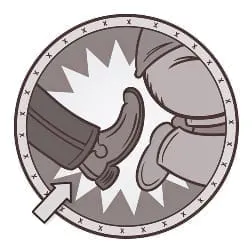 Part 1 in a series of blog posts about the mechanics of a personal injury case.
Part 1 in a series of blog posts about the mechanics of a personal injury case.
The stodgy definition of liability:
- the state of being responsible for something, esp. by law.
What “liability” really means:
- a person or corporation deserves a swift kick in the pants, so to speak, because they screwed up, and hurt or even killed someone.
In personal injury cases, the concept of liability plays a big role. You could say a leading role. Without liability, you have no case. So, a trial attorney’s primary mission is to prove liability – to show the jury how Wrongdoer Doe’s actions, be it drunk driving or bringing a dangerous product to market, led to your injury or your loved one’s death. Our job is to make the connection and to tell the story about the wrongdoer’s liability.
Liability is a story about making the wrong choice.
“To err is human; to forgive, divine,” goes the proverb. Often, part of the healing process after a serious injury is some measure of forgiveness to the person who caused you harm. But, as a society, we must have a way to hold people and companies responsible for their mistakes, and to help compensate those who were hurt because of those mistakes. This is part of what helps society function.
The stories we tell about making wrong choices are legion. Our choices and the ripple effect those choices have on others are the stories we tell in novels, on TV, at the movies, and in the courtroom.
To hold someone liable is to hold them accountable for their actions.
“Make a mess, clean it up.” To get behind the wheel and drive while intoxicated is a choice. The person who makes this choice and hits someone is liable for the victim’s pain and suffering. The drunk driver is “on the hook,” so to speak, for the victim’s loss, for the victim’s injury, disability, time on the mend, medical bills, and so forth. The drunk driver is responsible for his choice, and responsibility demands that he make good with those who are hurt by that choice. That is what liability is all about.
Our legal system isn’t perfect. What we have is the possibility of financial compensation and an airing of grievances in the conference room or courtroom. The best we can do is try to make the victim as close to whole as possible, to the way things were before, and that is done by holding the wrongdoer accountable for his or her actions.
